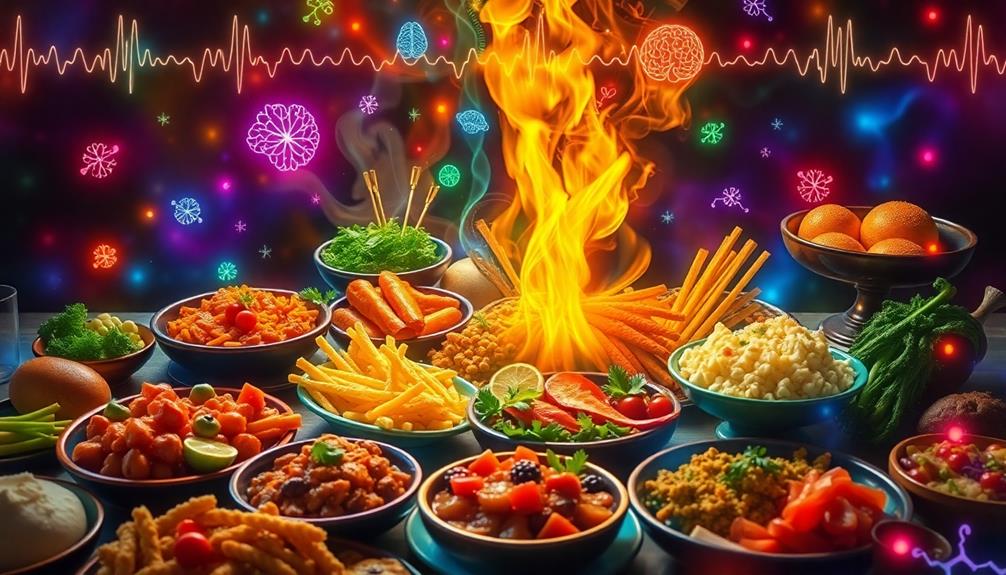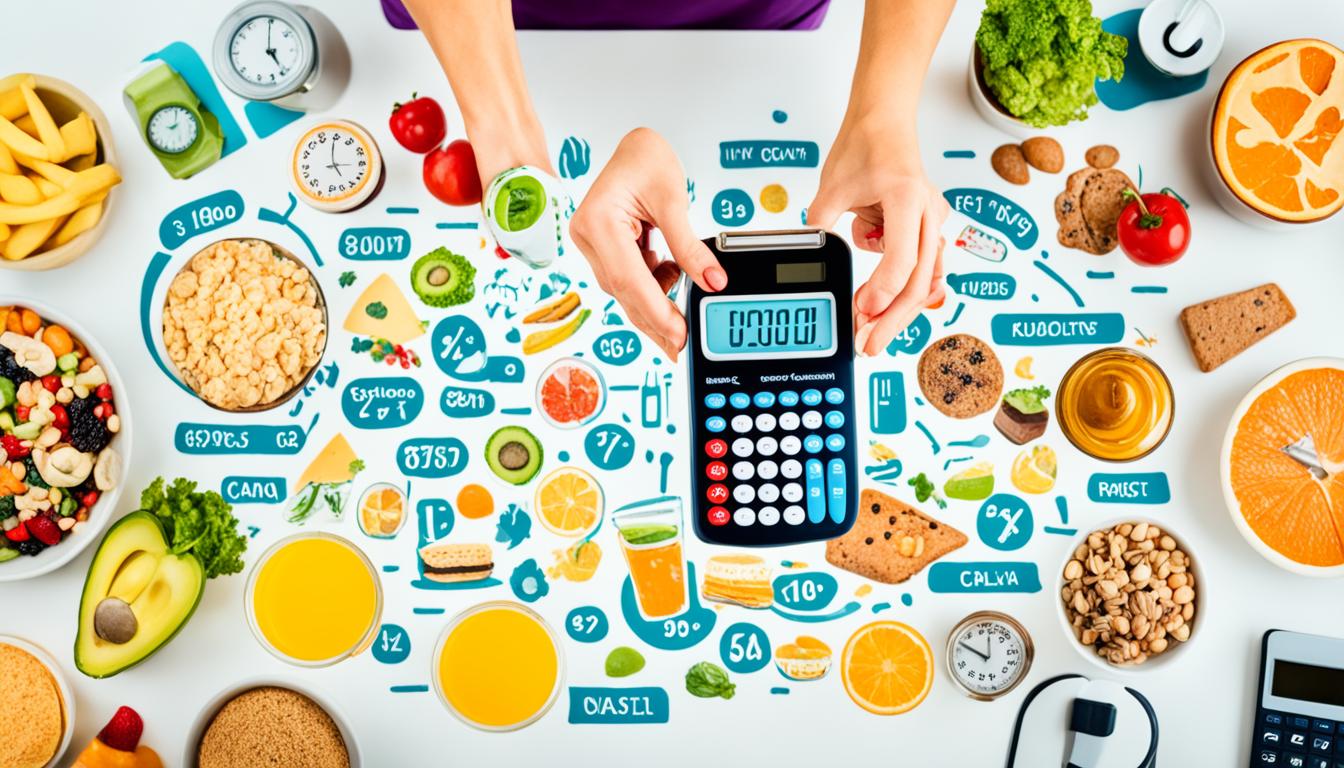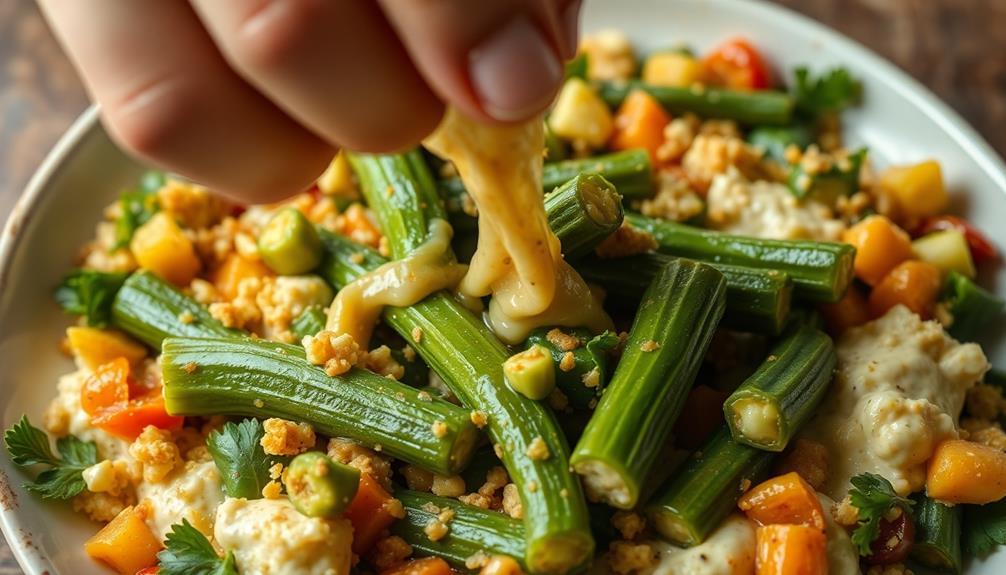Food-induced euphoria is a fascinating blend of brain chemistry and psychology. When you eat, your brain releases dopamine, creating feelings of pleasure. Processed foods, especially those high in sugar and fat, greatly boost this dopamine surge, elevating cravings and mimicking addictive behaviors. Stress or boredom can trigger a desire for these indulgent foods, complicating your control over eating. Unfortunately, this leads to compulsive eating patterns that mirror addiction issues. Recognizing these triggers can help you make better food choices and regain control. Explore how these elements interact and influence your relationship with food.
Key Takeaways
- Dopamine release during food consumption signals pleasure, enhancing feelings of euphoria associated with eating, particularly with high-sugar and high-fat foods.
- Processed foods trigger significant dopamine surges, mimicking addictive substances and leading to cravings and compulsive eating behaviors.
- Emotional states and environmental cues can exacerbate cravings for hyperpalatable foods, creating a cycle of emotional eating and temporary euphoria.
- Neurochemical imbalances, such as ghrelin and leptin fluctuations, contribute to heightened cravings and the pursuit of pleasurable food experiences.
- Regular consumption of ultraprocessed foods may lead to dopamine receptor desensitization, requiring more food intake to achieve the same pleasurable response.
Brain Reward System

Understanding the brain's reward system is essential for grasping how food influences our behavior and emotions. The release of dopamine, a key neurotransmitter, signals pleasure and reinforces your eating habits.
When you consume highly processed foods, especially those rich in sugar and fat, your brain experiences a surge in dopamine release, making you crave these foods even more. This heightened response encourages repeated food consumption, as your brain activates reward pathways that feel good.
Notably, indulging in flavorful dishes like Mushroom Masala can also trigger dopamine release, enhancing your overall enjoyment of meals. However, regular intake of these processed foods can downregulate dopamine receptors, making it harder for you to feel pleasure from food. As a result, you may need larger quantities to achieve the same rewarding sensation, leading to a cycle that mimics addiction.
When cravings strike, the same brain activation patterns emerge as those seen in drug addiction, highlighting how compulsive eating behaviors can develop.
If you suddenly restrict access to your favorite foods, you might experience withdrawal symptoms, like irritability and intensified cravings. This reaction underscores your brain's dependency on food for pleasurable experiences, illustrating just how powerful the reward system is in shaping your relationship with what you eat.
Neurochemical Response

The neurochemical response to food consumption plays a significant role in the euphoric feelings you experience while eating. When you indulge in hyperpalatable foods, particularly those high in sugar and fat, your brain releases dopamine. This neurotransmitter is closely tied to pleasure and reward, creating sensations similar to those produced by addictive substances.
For instance, indulging in rich dishes like Red-Braised Pork Belly can enhance these feelings due to their high-fat content and complex flavors. As you savor these foods, neurochemical changes occur, enhancing your mood and reinforcing your desire for more.
Consuming diets rich in sugar and carbohydrates can boost dopamine levels, but over time, this can lead to decreased sensitivity and availability of dopamine receptors. You might find that you crave these pleasurable foods even more, falling into cycles of compulsive eating behaviors.
The impact of serotonin and endorphins further amplifies this euphoric experience, contributing to a sense of well-being.
However, if you try to cut back on these highly processed foods, you may experience withdrawal symptoms, such as irritability and intense cravings. These reactions highlight the neurochemical dependency that can develop, making it challenging to resist the allure of foods that ignite such powerful feelings of pleasure.
Psychological Triggers

Psychological triggers often push you toward food-induced euphoria, especially when emotions like stress, sadness, or boredom take hold. In these moments, you might find yourself reaching for high-sugar or high-fat foods, seeking comfort in their familiar flavors.
Environmental cues, such as the tempting sight or smell of certain treats, can evoke intense food cravings, reinforcing your association between these foods and pleasure. For instance, the aroma of a freshly baked pumpkin roll can evoke childhood memories, making it harder to resist.
Conditioning plays a significant role in this dynamic. If you've had positive experiences with specific foods in the past, those memories can create strong cravings, making you more susceptible to emotional eating. Cognitive distortions, like all-or-nothing thinking, can exacerbate these cravings. You may feel guilt or shame after indulging, further entrenching unhealthy eating patterns.
Social influences also amplify your cravings. Peer behaviors and cultural norms around food can push you toward certain choices, especially during communal eating occasions. When everyone around you indulges, it becomes harder to resist.
Recognizing these psychological triggers can help you navigate emotional states and make more mindful food choices, steering you toward healthier habits while still enjoying the pleasure that food can bring.
Impact of Processed Foods

When you reach for processed foods, you're not just satisfying hunger; you're activating powerful neurological responses that can lead to addiction.
The combination of sugar and fat in these snacks triggers cravings that can alter your eating behaviors and impact your mental health.
For instance, indulging in a classic Mexican treat like quesadillas can provide a more satisfying experience compared to processed snacks.
Understanding this connection is essential as you navigate your dietary choices and their effects on your well-being. Making informed decisions about what you eat can significantly enhance your physical and mental health. By exploring various resources, you can discover ways to incorporate nutrient-dense foods into your meals. For instance, the nourish cookbook for a healthy lifestyle offers a wealth of recipes and guidelines to help you make choices that support your overall wellness.
Addiction Potential of Processed Foods
Processed foods can easily pull you in with their irresistible combination of sugar and fat, creating a sensation that's hard to resist. These hyperpalatable foods trigger significant dopamine release in your brain, leading to a feeling of pleasure that can mimic the effects of addictive substances like cocaine.
As you indulge in these snacks, you activate your brain's reward circuitry more efficiently than when eating natural foods. In contrast, traditional dishes from diverse cuisines, such as those found in Brazilian cuisine, often incorporate natural ingredients that provide complex flavors and nutritional benefits, which can lead to a more balanced eating experience.
Daily consumption of processed foods can alter your brain's reward circuits, reinforcing cravings and increasing the likelihood of overeating. Research indicates that about 20% of adults may exhibit signs of food addiction, particularly those who consume high amounts of processed foods.
The more you indulge, the stronger your cravings become, making it difficult to resist that next bite.
Moreover, frequent intake of ultraprocessed foods can lead to withdrawal-like symptoms. You might find yourself feeling irritable or experiencing intense cravings when you try to cut back, similar to what substance addiction looks like.
Understanding the addiction potential of processed foods can help you make more informed choices about what you eat and how it impacts your overall well-being.
Neurological Responses to Ingredients
The ingredients in processed foods can have profound effects on your brain's chemistry and functioning. When you consume these foods, especially those high in sugar and fat, your brain releases significant amounts of dopamine, activating your reward systems. This can create a neurological response similar to that triggered by addictive substances like cocaine.
For instance, a 2023 study showed that high-fat, high-sugar milkshakes led to notable dopamine release, highlighting the potent effects of hyperpalatable foods. Similarly, classic American diner dishes like loaded baked potatoes can elicit similar responses due to their rich ingredients, making them comfort food favorites.
However, there's a catch. Repeated intake of processed foods may cause your dopamine receptors to downregulate, meaning you'll need to eat more to experience the same pleasure. This cycle can enhance the addictive potential of these snacks, making it easier to crave them.
Research suggests that the combination of sugar and fat in processed foods efficiently activates your brain's reward centers, leading to increased food intake and dependency.
Individuals with reduced dopamine receptor availability may be particularly susceptible to this cycle, as highlighted by the concept of Reward Deficiency Syndrome (RDS). As a result, you might find yourself reaching for those hyperpalatable foods more often than you'd like.
Cravings and Behavioral Changes
Cravings often hit hard after indulging in hyperpalatable foods, making it tough to resist reaching for more. When you consume processed foods, especially those high in sugar and fat, your brain releases significant amounts of dopamine, activating the reward system much like addictive substances do. This dopamine rush makes you crave these foods even more, leading to a vicious cycle.
In contrast, whole foods, like seasonal vegetables and fresh herbs, can provide satisfaction without the intense cravings that processed options induce, allowing for a more balanced approach to eating nutritious blend.
If you try to cut back on ultraprocessed foods, you might experience withdrawal symptoms like irritability and intensified cravings. Frequent consumption can also decrease dopamine receptor availability, meaning you need larger quantities of these foods to feel satisfied.
The unique combinations of mixed ingredients in processed snacks enhance their appeal, further stimulating your brain's reward centers.
Your emotional state plays a significant role, too. Stress or sadness can heighten cravings for processed foods, reinforcing patterns of emotional eating. This cycle impacts your behavioral patterns, making it harder to break free from unhealthy eating habits.
Recognizing how cravings work can empower you to make better choices and regain control over your eating habits.
Cravings and Impulsivity

When you experience cravings for sugary or fatty foods, your brain's reward system kicks into gear, releasing dopamine and driving impulsive eating.
This response is similar to the pleasure derived from indulging in traditional desserts like Kue Putu or Dadar Gulung, which are often enjoyed during festive occasions.
These neurochemical triggers can cloud your decision-making, making it tough to resist that tempting snack.
Understanding how cravings influence your behavior can help you take control and make healthier choices.
Neurochemical Triggers Explained
Food cravings are driven by a complex interplay of neurochemical signals in your brain. When you indulge in hyperpalatable foods, dopamine floods your system, creating pleasure and reinforcing your desire to eat more.
For instance, dishes like Muamba De Galinha or Kitfo can evoke strong emotional responses and cravings due to their rich flavors and cultural significance. However, repeated consumption can lead to decreased availability of D2 receptors, meaning you need to eat even more to experience the same high.
Here are three key factors influencing your cravings:
- Ghrelin and Leptin: Ghrelin, the hunger hormone, ramps up your appetite, while leptin helps you feel full. An imbalance between these hormones can lead to increased cravings.
- Dopamine's Role: As you enjoy high-sugar and high-fat foods, dopamine levels rise, activating your brain's reward system. This can create a cycle of cravings that's hard to break.
- Emotional Triggers: Stress and boredom can amplify your cravings, making you seek out comfort foods that further stimulate the reward system.
Understanding these neurochemical triggers can help you manage your eating behavior and make healthier choices amidst the allure of cravings.
Behavioral Impulsivity Impact
You might find yourself giving in to those irresistible cravings, often driven by a surge of behavioral impulsivity. This impulsivity can lead you to act on intense food desires without considering the health consequences, resulting in compulsive eating behaviors.
Research shows that higher levels of impulsivity correlate with increased food cravings, especially for high-sugar and high-fat foods. These foods trigger your brain's reward system much like drug addiction does, making it hard to resist. For instance, the rich and velvety texture of Chocolate Gravy can be particularly enticing and may lead to impulsive eating decisions.
If you experience emotional states like stress or sadness, these feelings can exacerbate impulsivity, pushing you towards comfort foods and potentially leading to cycles of binge eating and distress.
The neurobiological basis of these cravings reveals that individuals with food addiction often display greater impulsivity in decision-making tasks.
Fortunately, there are interventions available. Mindfulness training and cognitive-behavioral strategies have proven effective in reducing impulsivity, helping you manage cravings and improve your eating behaviors.
Cravings and Decision-Making
Cravings for hyperpalatable foods can hijack your decision-making process, steering you towards choices that prioritize instant gratification over long-term health.
When cravings hit, your brain's reward system kicks in, often compromising your ability to make rational decisions about food. This results in increased impulsivity, leading you to opt for high-calorie, low-nutrient options even when healthier alternatives are available.
Here are three factors that influence cravings and impulsivity:
- Emotional States: Feelings like stress or sadness can intensify cravings, driving you to seek comfort in unhealthy foods rather than focusing on nutritional needs.
- Food Cues: The mere presence of food cues in your environment can trigger cravings, prompting impulsive eating behaviors that override your healthy eating intentions.
- Addiction-Like Responses: Research shows that cravings activate brain regions similar to those involved in drug addiction, further diminishing your control over food consumption.
Health Implications

Given the rising popularity of ultraprocessed foods, it's vital to recognize their significant health implications. These foods often lead to increased dopamine release, mimicking addictive substances. This can foster compulsive eating behaviors, contributing to food addiction and making it harder for you to resist unhealthy food choices.
The health risks associated with diets high in ultraprocessed foods are alarming. Studies show that regular consumption is linked to a 25% increase in mortality risk.
Furthermore, as you indulge in these hyperpalatable foods, your dopamine receptors can become less responsive, meaning you'll need to eat more to achieve the same satisfaction over time. This cycle can result in weight gain and exacerbate cravings, creating a vicious loop that's tough to break.
Psychosocial factors also play a role; your environment and emotional state can influence your relationship with food, making it even harder to maintain a balanced diet.
Excessive sugary soda consumption doesn't just lead to weight gain but also dental issues and dependency. Recognizing these health implications is vital for making informed dietary choices and fostering a healthier relationship with food.
Frequently Asked Questions
Why Does Food Make Me Feel High?
Food can make you feel high because it activates your brain's reward system, releasing dopamine and endorphins. These chemicals create feelings of pleasure, making you crave those tasty treats even more over time.
What Is the Science Behind Euphoria?
Euphoria's science revolves around neurotransmitters, like dopamine, which signal pleasure in your brain. When you experience joy, your body releases these chemicals, creating feelings of happiness, excitement, and even contentment during moments of intense enjoyment.
Why Does Food Cause Pleasure?
Did you know that 90% of people crave sweets? When you eat tasty foods, your brain releases dopamine, creating feelings of pleasure. This response encourages you to seek out those delicious foods repeatedly.
What Is the Science Behind Food Addiction?
Food addiction involves compulsive eating and intense cravings, activating your brain's reward system. Neuroimaging shows altered brain activity, especially in the striatum, indicating a dysregulated response to high-fat, high-sugar processed foods that trigger overconsumption.
Conclusion
To sum up, understanding the science behind food-induced euphoria highlights how our brains respond to what we eat. Did you know that nearly 90% of people report feeling happier after indulging in their favorite comfort food? This illustrates the powerful link between food and mood. However, while those temporary highs can be enjoyable, being mindful of what you consume can help you maintain a healthier relationship with food and avoid the pitfalls of cravings and impulsivity.










